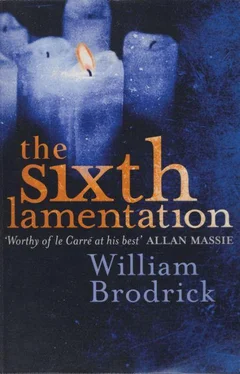William Brodrick - The Sixth Lamentation
Здесь есть возможность читать онлайн «William Brodrick - The Sixth Lamentation» весь текст электронной книги совершенно бесплатно (целиком полную версию без сокращений). В некоторых случаях можно слушать аудио, скачать через торрент в формате fb2 и присутствует краткое содержание. Жанр: Триллер, на английском языке. Описание произведения, (предисловие) а так же отзывы посетителей доступны на портале библиотеки ЛибКат.
- Название:The Sixth Lamentation
- Автор:
- Жанр:
- Год:неизвестен
- ISBN:нет данных
- Рейтинг книги:5 / 5. Голосов: 1
-
Избранное:Добавить в избранное
- Отзывы:
-
Ваша оценка:
- 100
- 1
- 2
- 3
- 4
- 5
The Sixth Lamentation: краткое содержание, описание и аннотация
Предлагаем к чтению аннотацию, описание, краткое содержание или предисловие (зависит от того, что написал сам автор книги «The Sixth Lamentation»). Если вы не нашли необходимую информацию о книге — напишите в комментариях, мы постараемся отыскать её.
The Sixth Lamentation — читать онлайн бесплатно полную книгу (весь текст) целиком
Ниже представлен текст книги, разбитый по страницам. Система сохранения места последней прочитанной страницы, позволяет с удобством читать онлайн бесплатно книгу «The Sixth Lamentation», без необходимости каждый раз заново искать на чём Вы остановились. Поставьте закладку, и сможете в любой момент перейти на страницу, на которой закончили чтение.
Интервал:
Закладка:
‘Indeed. And his job was to combat the Resistance.’
‘Not a very devout thing to do.’
‘Bear with me, Father. For therein lies an interesting conundrum. The Resistance assassinated the Vichy minister of information in 1944. The Germans wanted reprisals. According to Touvier, they demanded the execution of a hundred Jews. He says he bargained them down to thirty, and ordered the deaths of seven, at Rillieux-la-Pape, as an appeasement to save the remaining twenty-three.’
‘Where’s the devotion in that?’
‘Well, there isn’t any of course. Only it set me thinking. Here is a man who will, in due course, be convicted in absentia of treason. I don’t know any more about him, and what he said was probably nonsense, but it occurred to me that it was only those who collaborated who were in a position to bargain with the Nazis if the opportunity arose. That is not, of course, a reason for collaborating. But it suggests an interesting abstract principle: in certain situations, only someone who’s lost himself can do the good deed, even though he can never make atonement for what he has done.’
A shared pause of reflection ensued. Wilf picked up a newspaper, found the crossword and said: ‘Even so, I can’t for the life of me understand why Touvier was hidden in a monastery.’
‘Pardon?’ said Anselm.
Wilf repeated his observation, frowning gravely at the first clue. ‘Fundamentalists, apparently Integristes. Not our cup of tea.’ A touch complicated, he added, because Touvier had been pardoned by Pompidou. Ten years later he went into hiding when it transpired he could still be prosecuted. He was eventually convicted of the Rillieux murders in 1994, the first Frenchman to go down for war-related crimes against humanity.
‘Hideously embarrassing for the Church when they caught him, of course,’ pursued Wilf, laying the paper on his lap, ‘if only because it dredged up the ecclesiastical compromises of the past.’ During the war, he said, the Church had been in a very difficult position. Petain and Vichy reintroduced support that had been previously withdrawn by a viciously anti-clerical state. An alliance grew that was far too cosy ‘It was all rather complicated.’
Slightly uneasy, Anselm left Wilf to his crossword. As he got ready to clean the refectory floor he all but heard another voice, whispering, and he saw the luminous eyes of Cardinal Vincenzi:
‘It’s all rather complicated.’
Chapter Thirty
1
The court rose for the day after Mr Bartlett had made his surprising announcement that followed the completion of Madame Beaussart’s evidence.
‘That seems a good place to stop, gentlemen,’ said Mr Justice Pollbrook.
Bile stung Lucy’s gut and she thought bitterly: You’re right. There’s no point in going on. It’s a mess; a bloody, senseless mess. Max Nightingale hurriedly brushed by, his mouth set tight. The man in the cardigan beside her stood to make way, his features relaxed as if by an expectation painfully fulfilled. Lucy left the court in a sort of panic, as though the air had swollen with a stench. She ran to St Paul’s tube station and shoved herself into the doorway of a heaving train. Elbows, staking their claim, stiffened. The carriage door slid shut, scraping across her back. I endure this, she thought, so that I can give my grandmother a summary of ‘the day’s play’. That’s what one barrister had called it.
The opening of the trial had brought focus to Lucy’s life, lost since the death of Pascal. Struggling to attend lectures, she had confided in her tutor, a man who seemed to apprehend a fear she had not even mentioned: the prospect of dropping out of the course, a second failure from which she might not recover.
He referred Lucy to a college counsellor called Myriam Anderson. Talking helped to a degree; but death, of all experiences, could only be accommodated through further suffering, and entangled with that prospect was the certain death of Agnes. These two events, one past, the other to come, lay like a frame on either side of the trial, giving it shape. Myriam had said:
‘It’s tempting to separate life’s problems into miniatures — that’s when the trouble starts. Your greatest asset is that you see the single canvas: Myriam watched Lucy closely before saying, ‘Don’t rule out another death.’
‘Sorry?’
‘Another death? an outcome to this trial that defeats your hope.’
By the time Lucy reached Hammersmith, the long shadows of evening lay as still as paint, losing depth and shape as the light withdrew She pushed her key into Agnes’ front door lock and stepped inside, slipping on the wet tiles and crashing into the wall. Bloody Wilma.
Agnes could no longer speak or walk. A nurse came twice a week. Susan paid a visit every other day As for Freddie, the monumental unease that had once kept him apart from Agnes seemed to be crumbling, not at the edges but deep down in its foundations. Lucy saw a pallor spread across his face whenever he came to Chiswick Mall: he simply could not bear to witness the slow, tortured decline that was received by Agnes with such shattering calm.
Lucy crept down the dark corridor towards the thin band of orange light across the floor. She stood at the door, pushing it silently ajar. Agnes lay completely still. So still Lucy thought she had gone. Her heart raced. And then Agnes lifted one arm, like an ailing Caesar at the games. Lucy approached and sat by the bed.
‘The trial’s under way
A nod.
‘We heard from Madame Beaussart today the journalist you met in Auschwitz, the one who dreamed about making jam and you dreamed about eating it. You wrote about her.’
A nod.
‘She remembers almost everything.’
Lucy could go no further.
Agnes didn’t respond. Her face could not be read; only her eyes, and they were turned to one side. Had she already heard the news — about the first witness for the Crown abandoning the stand, exclaiming through her tears that she did remember Schwermann? Had she heard about Mr Bartlett’s surprise announcement to the court? These were things Lucy would not say, not to Schwermann’s most secret victim, lying here unable to reply Agnes would discover them soon enough when Wilma declaimed from The Times report next morning.
Agnes moved her head towards the bedside table and her alphabet card. She had a simple method. After pointing out the letters of a word, she paused and rested her hand. Then she spelled out the next word. It was the lightness of her wrist, moving like a conductor, and that pause, still fingers upon her breast between measures, that broke Lucy down.
P-A-S-C-A-L
A long pause followed: this introduced the subject she wanted to talk about, like a heading.
T-R-Y
Pause.
T-O
Pause.
C-A-L-M
Pause.
T-H-E
Pause.
F-I-R-E
Pause.
W-I-T-H-O-U-T
Pause.
P-U-T-T-I-N-G
Pause.
I-T
Pause.
O-U-T
Pause.
Lucy nodded gratefully, reaching out to meet the anxiety, the entreaty deep within her grandmother’s blue eyes. Sensing the question that was trapped in Agnes’ head she added, ‘The college are being enormously helpful. They’ve told me to take a few weeks off. They’re sure I can catch up.’
Agnes touched Lucy’s arm, and then continued:
I-F
Pause.
V–I-C-T-O-R
Pause.
A-P-P-E-A-R-S
Pause.
I
Pause.
M-U-S-T
Pause.
S-E-E
Pause.
H-I-M
Pause.
B-E-F-O-R-E
Pause.
I
Pause.
D-I-E
Lucy stroked her grandmother’s shaking hand. Agnes couldn’t point for long. Anguish pulled down the corners of her mouth.
‘Gran, I think he’s gone for good.’
Agnes shook her head.
Читать дальшеИнтервал:
Закладка:
Похожие книги на «The Sixth Lamentation»
Представляем Вашему вниманию похожие книги на «The Sixth Lamentation» списком для выбора. Мы отобрали схожую по названию и смыслу литературу в надежде предоставить читателям больше вариантов отыскать новые, интересные, ещё непрочитанные произведения.
Обсуждение, отзывы о книге «The Sixth Lamentation» и просто собственные мнения читателей. Оставьте ваши комментарии, напишите, что Вы думаете о произведении, его смысле или главных героях. Укажите что конкретно понравилось, а что нет, и почему Вы так считаете.












